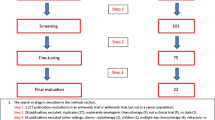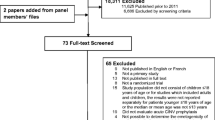Abstract
Purpose
This review summarizes the recommendations for the prophylaxis of acute and delayed nausea and vomiting induced by multiple-day chemotherapy, high-dose chemotherapy, and breakthrough nausea and vomiting as agreed at the MASCC/ESMO Antiemetic Guidelines update meeting in Copenhagen in June 2015.
Methods
A systematic literature search using PubMed from January 01, 2009 through January 06, 2015 with a restriction to papers in English was conducted.
Results
There were three phase III randomized trials in patients undergoing high-dose chemotherapy and stem cell transplant and eight single arm non-randomized clinical studies (single in patients undergoing transplantation and one in patients receiving multiple-day chemotherapy treatment). We used a total of two randomized clinical trials in this guideline update. For patients receiving treatment for breakthrough chemotherapy-induced nausea and vomiting, a phase III randomized trial investigating the use of olanzapine versus metoclopramide in patients receiving highly emetogenic chemotherapy and a second single arm study looking at the effectiveness of olanzapine were identified.
Conclusions
It was concluded that for patients receiving high-dose chemotherapy with stem cell transplant, a combination of a 5-HT3 receptor antagonist with dexamethasone and aprepitant (125 mg orally on day 1 and 80 mg orally on days 2 to 4) is recommended before chemotherapy.
For patients undergoing multiple-day chemotherapy-induced nausea and vomiting, a 5-HT3 receptor antagonist, dexamethasone, and aprepitant, are recommended before chemotherapy for the prophylaxis of acute emesis and delayed emesis.
For patients experiencing breakthrough nausea and vomiting, the available evidence suggests the use of 10 mg oral olanzapine, daily for 3 days. Mild to moderate sedation in this patient population (especially elderly patients) is a potential problem with this agent.
Similar content being viewed by others
Explore related subjects
Discover the latest articles and news from researchers in related subjects, suggested using machine learning.References
Einhorn LH, Grunberg SM, Rapoport B et al (2011) Antiemetic therapy for multiple-day chemotherapy and additional topics consisting of rescue antiemetics and high-dose chemotherapy with stem cell transplant: review and consensus statement. Support Care Cancer 19(Suppl 1):S1–S4
Svanberg A, Birgegård G (2015) Addition of aprepitant (Emend®) to standard antiemetic regimen continued for 7 days after chemotherapy for stem cell transplantation provides significant reduction of vomiting. Oncology 89:31–36
Schmitt T, Goldschmidt H, Neben K et al (2014) Aprepitant, granisetron, and dexamethasone for prevention of chemotherapy-induced nausea and vomiting after high-dose melphalan in autologous transplantation for multiple myeloma: results of a randomized, placebo-controlled phase III trial. J Clin Oncol 32:3413–3420
Bechtel T, McBride A, Crawford B et al (2014) Aprepitant for the control of delayed nausea and vomiting associated with the use of high-dose melphalan for autologous peripheral blood stem cell transplants in patients with multiple myeloma: a phase II study. Support Care Cancer 22:2911–2916
Sakurai M, Mori T, Kato J et al (2014) Efficacy of aprepitant in preventing nausea and vomiting due to high-dose melphalan-based conditioning for allogeneic hematopoietic stem cell transplantation. Int J Hematol 99:457–462
Uchida M, Ikesue H, Miyamoto T et al (2013) Effectiveness and safety of antiemetic aprepitant in Japanese patients receiving high-dose chemotherapy prior to autologous hematopoietic stem cell transplantation. Biol Pharm Bull 36:819–824
Stiff PJ, Fox-Geiman MP, Kiley K et al (2013) Prevention of nausea and vomiting associated with stem cell transplant: results of a prospective, randomized trial of aprepitant used with highly emetogenic preparative regimens. Biol Blood Marrow Transplant 19:49–55
Pielichowski W, Gawronski K, Mlot B et al (2011) Triple drug combination in the prevention of nausea and vomiting following busulfan plus cyclophosphamide chemotherapy before allogeneic hematopoietic stem cell transplantation. J Buon 3:541–546
Pielichowski W, Barzal J, Gawronski K et al (2011) A triple-drug combination to prevent nausea and vomiting following BEAM chemotherapy before autologous hematopoietic stem cell transplantation. Transplant Proc 43:3107–3110
Giralt SA, Mangan KF, Maziarz RT et al (2011) Three palonosetron regimens to prevent CINV in myeloma patients receiving multiple-day high-dose melphalan and hematopoietic stem cell transplantation. Ann Oncol 22:939–946
Rzepecki P, Pielichowski W, Oborska S et al (2009) Palonosetron in prevention of nausea and vomiting after highly emetogenic chemotherapy before haematopoietic stem cell transplantation-single center experience. Transplant Proc 41:3247–3249
Paul B, Trovato JA, Thompson J et al (2010) Efficacy of aprepitant in patients receiving high-dose chemotherapy with hematopoietic stem cell support. J Oncol Pharm Pract 16:45–51
Musso M, Scalone R, Crescimanno A et al (2010) Palonosetron and dexamethasone for prevention of nausea and vomiting in patients receiving high-dose chemotherapy with auto-SCT. Bone Marrow Transplant 45:123–127
Albany C, Brames MJ, Fausel C et al (2012) Randomized, double-blind, placebo-controlled, phase III cross-over study evaluating the oral neurokinin-1 antagonist aprepitant in combination with a 5HT3 receptor antagonist and dexamethasone in patients with germ cell tumors receiving 5-day cisplatin combination chemotherapy regimens: a Hoosier Oncology Group Study. J Clin Oncol 30:3998–4003
Olver I, Grimson P, Chatfield M et al (2013) Results of a 7-day aprepitant schedule for the prevention of nausea and vomiting in a 5-day cisplatin-based germ cell tumor chemotherapy. Support Care Cancer 21:1561–1568
Hamada S, Hinotsu S, Kawaj K et al (2014) Antiemetic efficacy and safety of a combination of palonosetron, aprepitant and dexamethasone in patients with testicular germ cell tumor receiving 5-day cisplatin-based combination chemotherapy. Support Care Cancer 22:2161–2166
Navari RM, Nagy CK, Gray SE (2013) The use of olanzapine versus metoclopramide for the treatment of breakthrough chemotherapy-induced nausea and vomiting in patients receiving highly emetogenic chemotherapy. Support Care Cancer 21:1655–1663
Chanthawong S, Subongkot S, Sookprasert A (2014) Effective of olanzapine for the treatment of breakthrough chemotherapy-induced nausea and vomiting. J Med Assoc Thail 97:349–355
Vig S, Seibert L, Green MR (2014) Olanzapine is effective for refractory chemotherapy-induced nausea and vomiting irrespective of chemotherapy emetogenicity. J Cancer Res Clin Oncol 140:77–82
Hocking CM, Kichenadasse G (2014) Olanzapine for chemotherapy-induced nausea and vomiting: a systematic review. Support Care Cancer 2014(22):1143–1151
Egerer G, Eisenlohr K, Gronkowski M et al (2010) The NK(1) receptor antagonist aprepitant does not alter the pharmacokinetics of high-dose melphalan chemotherapy in patients with multiple myeloma. Br J Clin Pharmacol 70:903–907
Einhorn LH, Rapoport B, Koeller J et al (2005) Antiemetic therapy for multiple-day chemotherapy and high dose chemotherapy with stem cell transplant: review and consensus statement. Support Care Cancer 13:112–116
Somerfield MR, Einhaus K, Hagerty KL et al (2008) ASCO clinical practice guidelines: opportunities and challenges. J Clin Oncol 26:4022–4026
Einhorn LH, Nagy C, Werner K et al (1990) Ondansetron: a new antiemetic for patients receiving cisplatin chemotherapy. J Clin Oncol 8:731–735
Herman TS, Einhorn LH, Jones SE et al (1979) Superiority of nabilone over prochlorperazine as antiemetics in patients receiving chemotherapy. N Engl J Med 300:1295–1297
Fox SM, Einhorn LH, Cox E et al (1993) Ondansetron versus ondansetron, dexamethasone and chlorpromazine in the prevention of nausea and vomiting associated with multiple-day cisplatin chemotherapy. J Clin Oncol 11:2391–2395
Herrstedt J, Sigsgaard TC, Nielsen HA et al (2007) Randomized, double-blind trial comparing the antiemetic effect of tropisetron plus metopimazine with tropisetron plus placebo in patients receiving multiple cycles of multiple-day cisplatin-based chemotherapy. Support Care Cancer 15:417–426
Vardy J, Chiew KS, Galica J et al (2006) Side effects associated with the use of dexamethasone for prophylaxis of delayed emesis after moderately emetogenic chemotherapy. Br J Cancer 94:1011–1015
Cook AM, Dzik-Jurasz ASK, Padhami AR et al (2001) The prevalence of avascular necrosis in patients treated with chemotherapy for testicular tumors. Br J Cancer 85:1624–1626
Einhorn LH, Brames MJ, Dreicer R et al (2007) Palonosetron plus dexamethasone for prevention of chemotherapy-induced nausea and vomiting in patients receiving multiple-day cisplatin chemotherapy for germ cell cancer. Support Care Cancer 15:1293–1300
Author information
Authors and Affiliations
Corresponding author
Ethics declarations
Conflict of interest
Lawrence H. Einhorn
Amgen: Stock Options
Biogenidec: Stock Options
Bernardo L. Rapoport
Merck and Co: Receipt of grants/research supports, receipt of honoraria or consultation fees and participation in a company sponsored speaker’s bureau
Tesaro Inc.: Receipt of grants/research supports, receipt of honoraria or consultation fees and participation in a company sponsored speaker’s bureau
Herron Therapeutics: Receipt of honoraria or consultation fees
Rudolph M. Navari
The author declares that he has no competing interests.
Jørn Herrstedt
Tesaro Inc.: Consultant Tesaro and remuneration SOBI
Mary J. Brames
The author declares that she has no competing interests.
Rights and permissions
About this article
Cite this article
Einhorn, L.H., Rapoport, B., Navari, R.M. et al. 2016 updated MASCC/ESMO consensus recommendations: prevention of nausea and vomiting following multiple-day chemotherapy, high-dose chemotherapy, and breakthrough nausea and vomiting. Support Care Cancer 25, 303–308 (2017). https://doi.org/10.1007/s00520-016-3449-y
Received:
Accepted:
Published:
Issue Date:
DOI: https://doi.org/10.1007/s00520-016-3449-y
Keywords
Profiles
- Bernardo Rapoport View author profile




